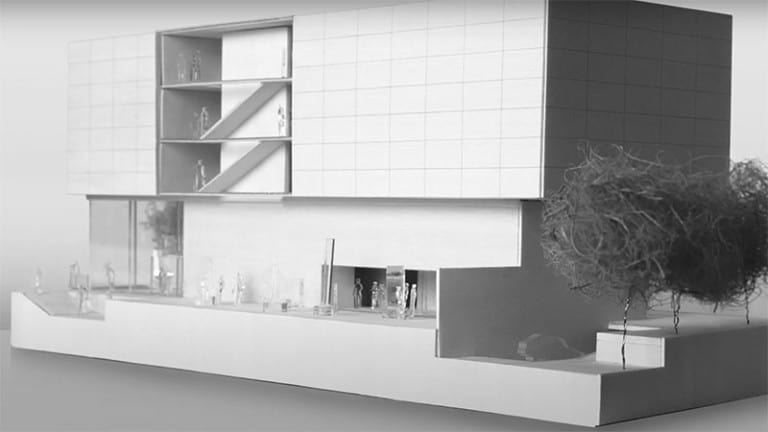Bengaluru’s Museum of Art and Photography (MAP) has pre-launched with an immersive digital experience. MAP has collaborated with Accenture to promote art with technologies including AI before the museum opens physically in 2021.
South India’s first major private art museum, the Bengaluru Museum of Art and Photography (MAP) has opened digitally prior to its physical launch in 2021. The museum doubled its workforce to ensure the digital museum could open. A six-day series of online events will celebrate the launch.
The physical museum is situated on Kasturba Road in Bengaluru (previously known as Bangalore). The city is known as the ‘Silicon Valley’ of India. The MAP houses around 20,000 artworks, dating from the tenth century to the present day. Its collections encompass Pre-modern Art; Modern and Contemporary Art; Textile, Craft and Design; Popular Culture; Folk and Tribal Art; and Photography.
The museum’s primary aim is to bring art and culture to as diverse an audience as possible. Launching digitally offers the chance to reach audiences, specifically younger people, who might previously have dismissed museums as irrelevant to their lives. Adding cutting edge technology increases that appeal. “One of our objectives is to create a museum-going culture that engages younger generations,” said Abhishek Poddar, founder-trustee of the museum. “A great way for museums to accomplish this is to harness technology to create engaging interactions that enable the user to learn something new and have fun in the process. We are confident that the collaboration between Accenture and MAP will create memorable experiences.”
India’s first conversational digital persona
Accenture Labs has combined AI with human-centred design to create a digital persona which will have realistic conversations with visitors. The AI was created using techniques including face superimposition and speech synthesis. Both are based on generative AI models and deep learning. A variety of technologies, such as natural language understanding and processing, along with emotion detection tech, ensures lifelike interactions. The digital persona echoes a real person in all ways – expressive, proactive, adaptive and responsive.
The project came about through Accenture’s Tech4Good initiative which seeks to find unique solutions for global challenges, using the latest disruptive technologies.
“We are excited to team with a cultural institution like MAP and use our market-leading digital capabilities to broaden the appeal of visual arts among today’s digital native youth,” says Rekha M. Menon, chairperson and senior managing director for Accenture in India.
The museum will also feature a 40 foot interactive, multi-touch MicroTile wall that displays all the artworks on view in real time. It will allow visitors to browse curated views of the collection and, in addition, create their own tours. A holographic installation will showcase several 3D works from the collection, says Accenture.
Making museums exciting and relevant
“The pandemic has allowed us to focus on the digital museum and to think of ways in which technology can play a role in enhancing the museum experience for a visitor, while within the comfort of their home,” said Poddar, in an interview with the Times of India.
“Art museums are often perceived as elitist, which is an idea we want to challenge. Folk traditions, textiles, design, popular visual culture surrounds us, and giving them their due prominence in the museum both highlights their intrinsic value and makes it more relatable for audiences.” He hopes to attract people who previously wrote off museums as “dusty, boring and dull spaces.” Instead, he promises: “Our vision with MAP is a museum experience that is fun, interactive and relevant.”
Art is Life – opening online festival
A six-day festival to commemorate the opening will celebrate art and culture with preeminent experts and artists, including art historian B N Goswamy, singer Kavita Seth, theatre guru Arundhati Nag, and visual artist Jitish Kallat.
This week features performances by various artists each centring on a work from the MAP collection, from Bollywood posters through textiles to modern photography. Artists include Mumbai’s Dharavi Rocks, jazz artist Rajeev Raja and his band, and a troupe of Yakshagana performers from Udupi. In addition, experts will discuss art objects from the MAP. Explorations will include experts from the Vitra Design Museum of Germany discussing the modern Rietveld Red Blue Chair; while experts from both MAP and the Rhode Island School of Design will discuss Gond artist Jangarh Singh Shyam and Inuit artists Kenojuak Ashevak.
Creating connections – Museums without Borders
MAP is also launching Museums without Borders, a series of video collaborations with 50 institutions around the world including the British Museum, the Museum of Fine Arts in Boston, the Rhode School of Design, the Detroit Institute of Arts, and The Morgan Library. The films explore the differences and connections between the art in their galleries.
“Museums without Borders allows audiences to discover new narratives and make comparisons without travel, an interesting alternative to gallery displays,” says the MAP in an official release.
Funded by private enterprise
Initial funding for the MAP came from Poddar and his wife. They auctioned works from their private collection to raise Rs 35 crore to fund the museum, according to The Hindustani Times.
Poddar then turned to private enterprise to raise funds, rather than seeking government finance. Patrons to date include Citi, Tata Trusts, Infosys, Wipro and Kiran Mazumdar Shaw.
“The economics of running a museum never add up, even during a boom, forget a recession,” said Poddar talking to The Hindustani Times. “We don’t even have an acquisition budget, because we’re still building our endowment.”
However he remains optimistic about the future. “At the start of the pandemic, sure there was despair, but we quickly pivoted when we saw what technology and the digital space could do.”
